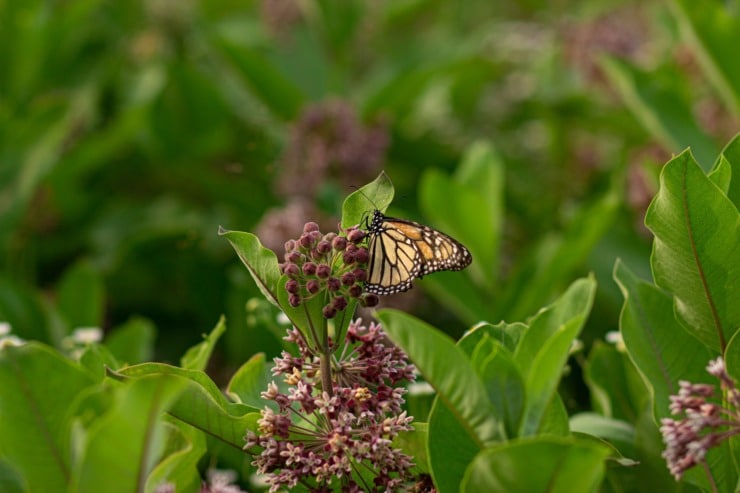Monarch Butterfly’s Wildflower
The wildflower Milkweed is what monarch butterflies lay their eggs on. It is the only food that a caterpillar can eat. It is also toxic to livestock and dogs.
“O mickle is the powerful grace that lies in plants, herbs, stones, and their true qualities,” the Friar Lawrence of Romeo and Juliet says while he upfills his willow basket with weeds and flowers. Even when we are sure we know what we are doing, the “special good” we are tending from the earth “[stumbles] on abuse,” and what we meant to help causes destruction leaving those of us who lived through it forever haunted.
As far as I know, we have no Milkweed in our backyard. We have Hydrangeas and Black-eyed Susans, and three oak trees.
And a groundhog.
I’m afraid though, that we used to have two.
My dog Corby, the one that is solely responsible for ending once and for all my utter fear and distaste for all dogs, is a squirrel and groundhog killer. I want to make all kinds of excuses for my dog, but unfortunately, she knows exactly what she’s doing. Corby is like Milkweed, killing some, and for others, she is the thing from the wild we need in order to bloom.
One almost summer night, Jesse and I were having dinner on our deck, while Corby, who wants to be wherever we are—especially if we are outside—sat on our deck’s steps, keeping watch. We have a big backyard, and Corby runs, sniffs, sleeps, and plays on every square inch of it, but when she first steps outside, if we are out there, she takes it upon herself to sit like a stone gargoyle at the top of a cathedral, and keep watch. Eventually, she will decide we are safe, and she’ll go about her business, usually surveying the perimeter like a soldier.
We know there’s a problem, or there will be a problem, when she freezes—every muscle in her body at attention and bulging. She looks just like those cartoon dogs with their tails pointing straight out and parallel to the ground and one paw in the air. She can stay like that for several minutes. She’s got the patience of a monk. (Monk’s have patience, right?)
This is how we knew there was trouble. Jesse and I slowly put our forks down, and as quietly as we could, slid our chairs away from the table. Off in the near distance, a brown ball rolling toward us like a wave moments before it runs out of itself and spreads out onto the shore, is a groundhog. She is coming for our backyard, specifically, underneath our deck. This is who Corby sees.
“I knew it,” I whisper to Jesse, gripping the deck’s railing.
“You knew what?” Jesse asks.
“That there was more than one,” I tell him. “This has to be the mother. We have babies underneath our deck.” Nothing else would run toward danger—toward a high possibility of death—like this.
Corby flies off the deck and toward the fence, barking. She matches the groundhog’s pace with ease and sharpness. If the groundhog goes left, so does Corby. If she goes right, so does Corby. They are millimeters away from each other—the only thing separating them is a fence.
Jesse runs to Corby, grabbing her collar and saying, “No! No! No!” It is no use, though. She won’t or can’t listen. So he turns his attention to the groundhog. “Get! Get! Get!” he says, kicking the fence to try and scare her away. She doesn’t move.
What is powerful grace, anyway? Is it what killed Romeo and Juliet but ended the stupid feud between the Montagues and Capulets? Or is powerful grace in the Prince’s call at the end of the play to “go hence to have more talk of these sad things”? I’m afraid it is in the Friar’s good intention to bring two lovers together; to give them a happy ending, but “virtue itself turns vice” and what we are left with is the task of continually asking, “Why did it have to come to this?”
I’m afraid it is in the Milkweed, that gives a caterpillar the sustenance she needs to turn herself into something entirely different, and that would end Corby’s life if she were to eat it, leaving me thinking I’d rather be afraid of dogs than miss the one who took away my fear the instant she walked into my backyard.
Powerful grace is in Jesse’s decision to hold Corby with all his strength, to lift the bottom of the fence so the groundhog can get underneath, to scream, “GO! GO! GO!” and she runs and Corby thrashes and Jesse holds her and the groundhog slips under our deck.
It is in all that springs from the earth—lovely and terrifying, delighted and dreadful and with each inhale we change, and with each exhale we act.
Try It
This week, write a poem about something that can be a thing of virtue or vice, like the wildflower Milkweed can be to the Monarch versus other creatures.
Featured photo by Lasclay Creative Commons, via Unsplash. Post by Callie Feyen.
- Poetry Prompt: Courage to Follow - July 24, 2023
- Poetry Prompt: Being a Pilgrim and a Martha Stewart Homemaker - July 10, 2023
- Poetry Prompt: Monarch Butterfly’s Wildflower - June 19, 2023

Megan Willome says
I planted milkweed
for the butterflies. Puppies
found it anyway.